The do's and don'ts when interacting with Chinese Singaporeans.
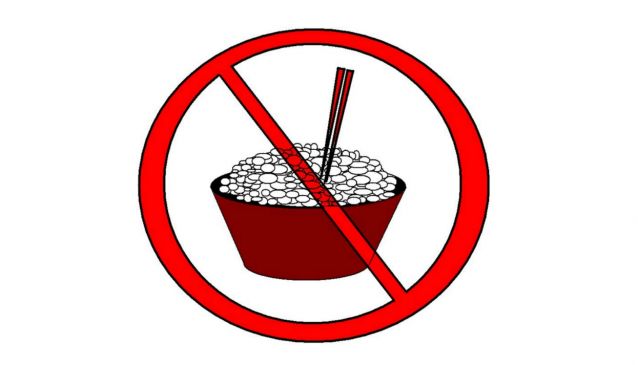
Elizabeth Kain for My Destination Singapore
Due to its history and despite its small size, Singapore’s culture is a colourful blend of Asian and Western heritage. Singaporeans are mostly descendants of immigrants from China and until today, the Chinese still form the majority of the resident population. Naturally, many of their ancestors' traditions are passed down through the generations and are still practiced as of today.
While no local Chinese-Singaporean will ever point out any inadequacy in your conduct, it might be interesting to learn about their practices and become more aware and understanding. Often, tourists don't understand why they get odd looks from nearby tables at the Hawker Center. Yet the explanation is simple and quite obvious: Chinese shudder when foreigners rest their chopsticks by plunging them straight into their rice which then resembles incense at a funeral.
Outside of Chinese festivals such as Chinese New Year, many of the most firmly-held traditions in Chinese culture are associated with major life events, most notably birth, marriage and death.
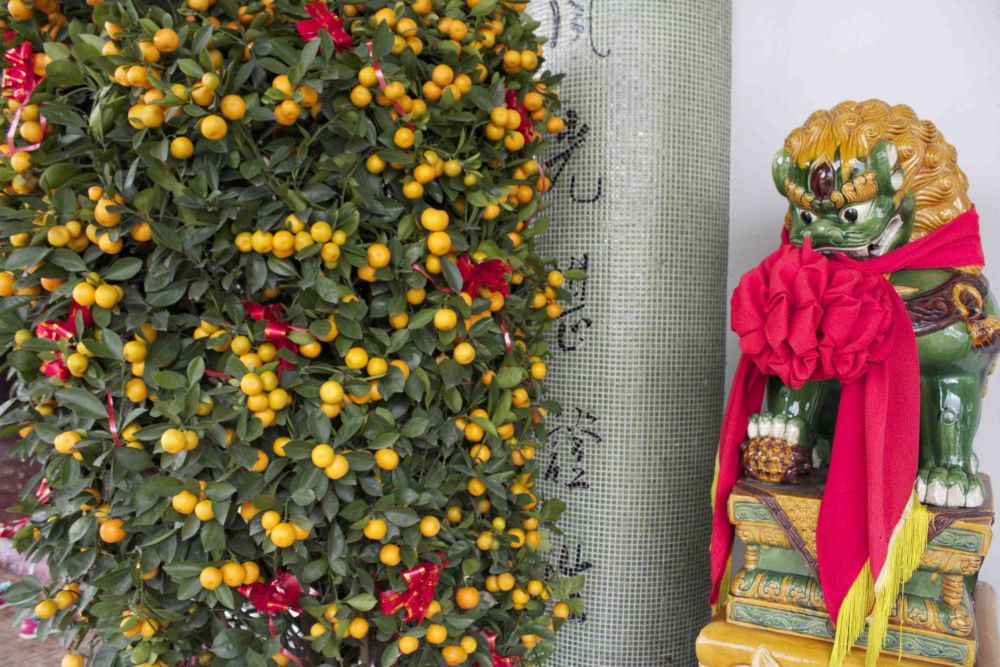
Lion guarding he entrance of a Chinese temple
Planning for the birth of a first child may begin well before a couple is even married. Elaine G., fitness specialist in Singapore says, “Prior to the ceremony, families who still value having a male as the firstborn child will find a baby boy to roll around on the nuptial bed. Some believe that if he urinates in the process, it is particularly fortuitous. Girls, on the other hand, are told not to touch the bed and are kept away. In this way, Chinese couples have a greater chance of giving birth to a baby boy."
While a son is fortuitous, some families want more. A male baby born in the year of the dragon is the crowning achievement for many traditional Chinese families. The Chinese zodiac operates on a twelve-year cycle, with an animal representing each year. Because a dragon stands for power and wealth, many will strive to give birth to a baby under this auspicious sign.
Singapore resident Alyssa C., mother of three, says, “Everyone wants a dragon baby, and it creates a huge problem for schools. When dragon children become school-aged, it’s difficult for children to get spots and that particular year remains overcrowded throughout their years in school.” Likewise, people may try to avoid having children during certain zodiac signs.
While pregnant, a woman should refrain from redecorating her home or hanging pictures, as this is considered bad luck during this sensitive time. Even watching someone else hammer a nail can possibly injure the baby or bring misfortune according to local superstition. Likewise, one must be familiar with the yin and yang of fruit and avoid those that are known to be “cold”, such as coconut, watermelon or pineapple, because they can cause miscarriages. Eating spikey fruit, such as durian, may cause baby acne.
Once the child is born, some families cannot wait to see what profession their baby will choose later in life. To foresee the child’s future, they may place items around him to see which ones attract his attention. If he crawls toward or touches a pen, he will be a scholar, money – a banker and so forth.
New mothers should not shower, wash their hair or exert themselves for one month after giving birth. Instead, they should eat lots of ginger because it warms the body. Likewise, they are encouraged to eat a soup with pig knuckles and ginger to accelerate their healing and regain strength.
When the baby is one month old, the family hosts a celebration to commemorate his birth. Eggs, representing long life are dyed red for good luck and distributed to guests. For birthday celebrations going forward, some continue to distribute lucky red eggs as well as consume noodles and steamed lotus buns, both of which represent longevity. Caution is advised, however, to cut noodles on your birthday is to shorten your life. Indeed, the longer the noodle, the longer your life will be.
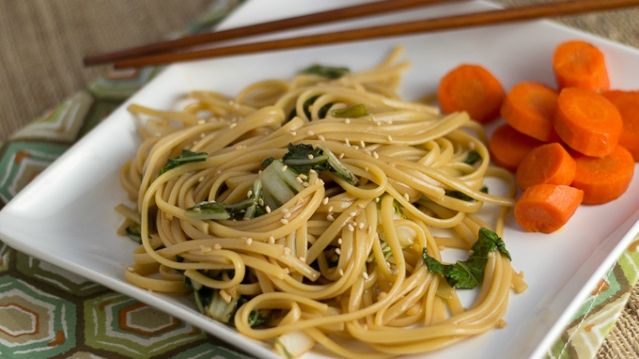
Long noodles for longvity
Once a loved one has reached the end of his long and prosperous life, it is only right that he should also enjoy himself in the afterlife. To ensure this happens, friends and family will bring packets of money – hell notes purchased at special stores - to the funeral to burn so that the deceased can afford to buy things he needs in the next phase. In addition to the notes, families may burn offerings – paper replicas – of cars, designer clothing, cosmetics, sailboats and recliner chairs – so that these too may be taken to the afterlife.
Red strings are provided at the funeral to tie around your finger, providing protection against evil spirits lingering among the dead. Funeral guests will also receive a packet of money and candy, which must be spent or thrown away before returning home to avoid bringing bad luck to your family.
Before leaving to attend a funeral, you may take extra precautions to ensure that none of the evil spirits follow you home from the service. Some Chinese families leave a bowl of water infused with pomegranate leaves (an abundance of lucky red seeds can bring a long life). Better yet, they carry a few of the leaves in their pockets for extra protection. These too, however, must be thrown away before returning home.
If you are engaged to be married when a loved one passes away, you must postpone the wedding for one to three years. Under no circumstances are engaged couples or pregnant women to attend funerals as this may invite misfortune. Likewise, families of those who have passed should not visit or be visited by others during Chinese New Year. This is part of the mourning ritual but also guarantees that no bad luck will pass from one family to another.
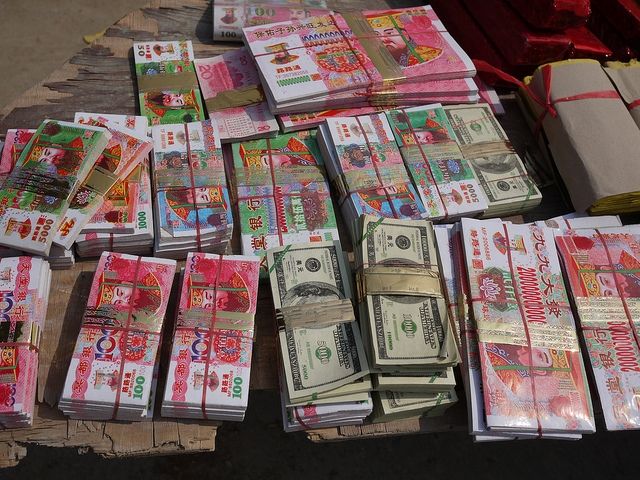
Chinese Paper Money
Of course, not all Chinese are alike, and whether you are Hokkien, Cantonese or Teochew may determine which customs you choose to follow. As is common in other cultures, the old tend to embrace traditions more passionately than their progeny.
On the other hand, when pressed, many young people admit to following ancient traditions “just in case.” And why not? We can all use a little good fortune.
Good luck!
Our local experts recommend visits of the following places to experience Chinese culture and traditions:
Chinatown
Chinese Heritage Foundation
Bright Hill Temple
Bukit Brown
Chinese Gardens
Woody Antique House
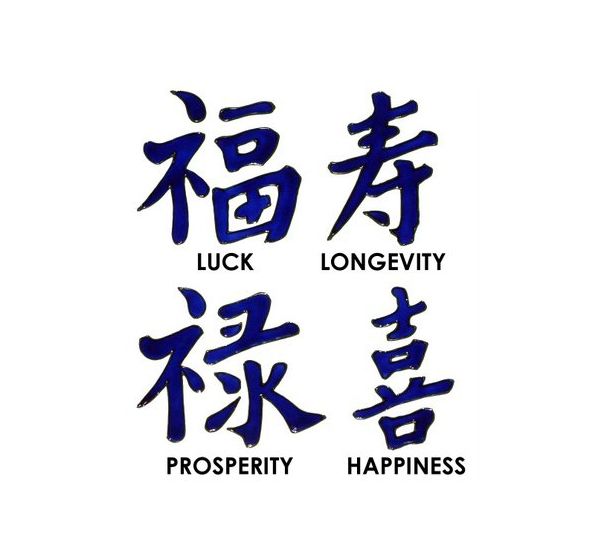
Good luck in Chinese